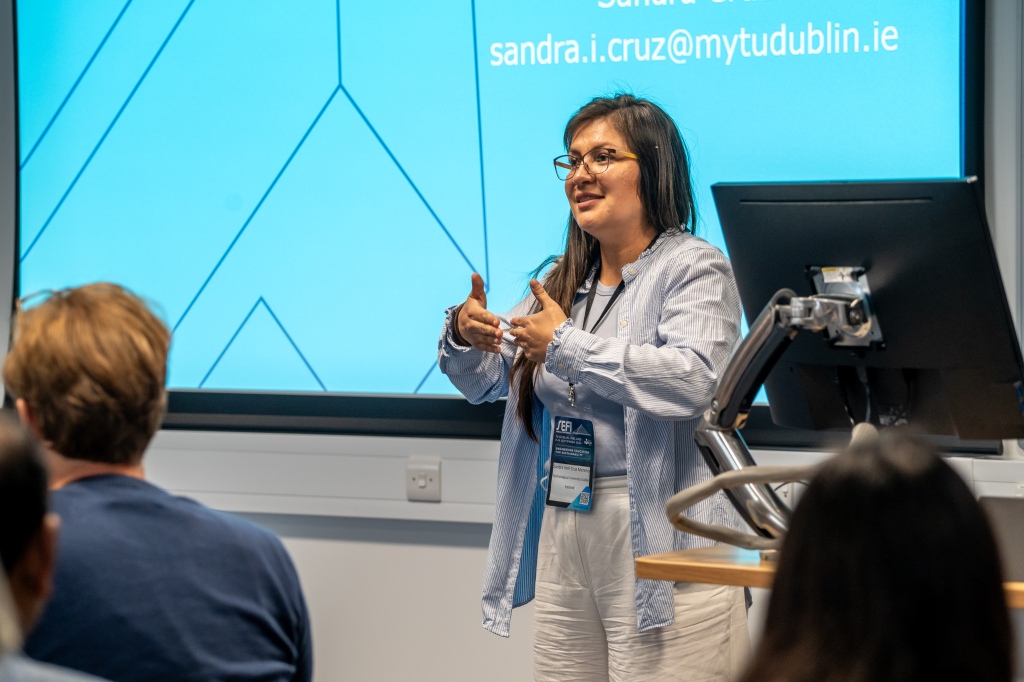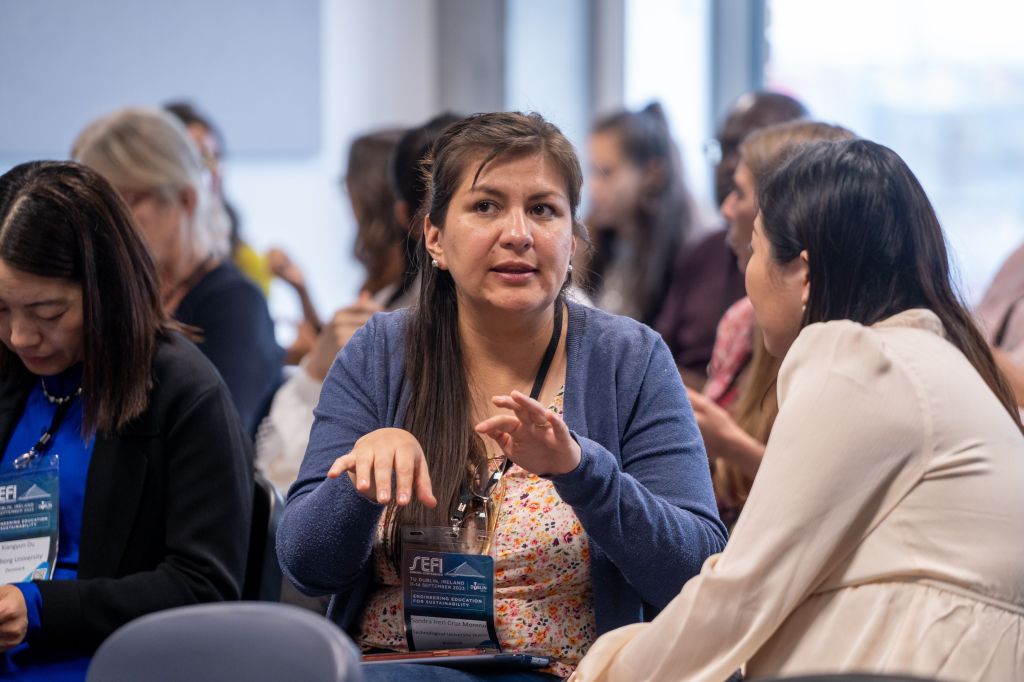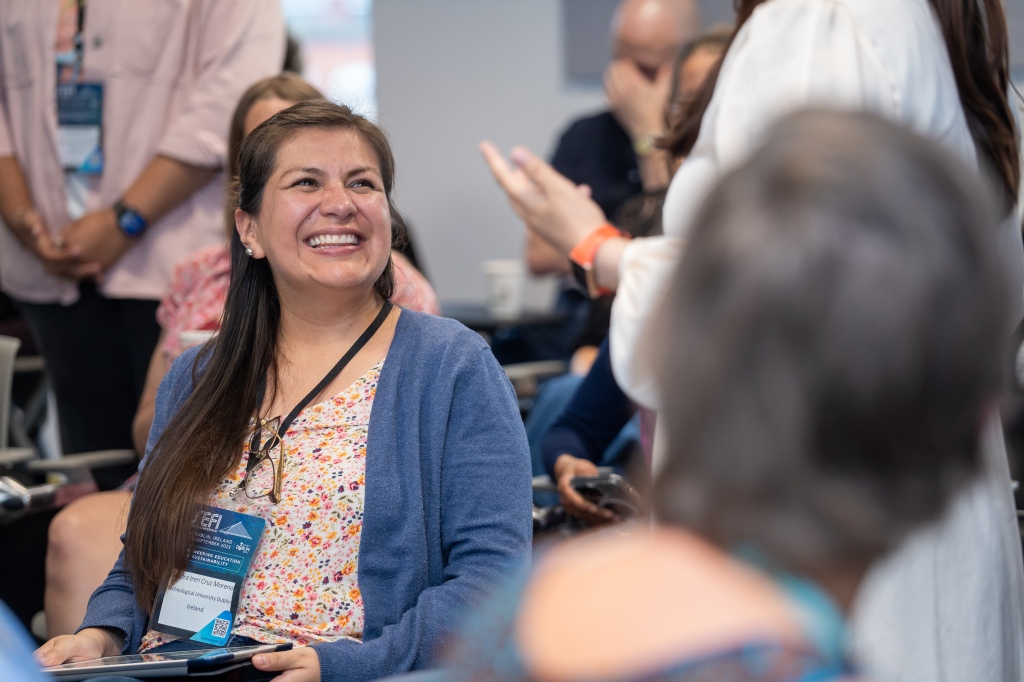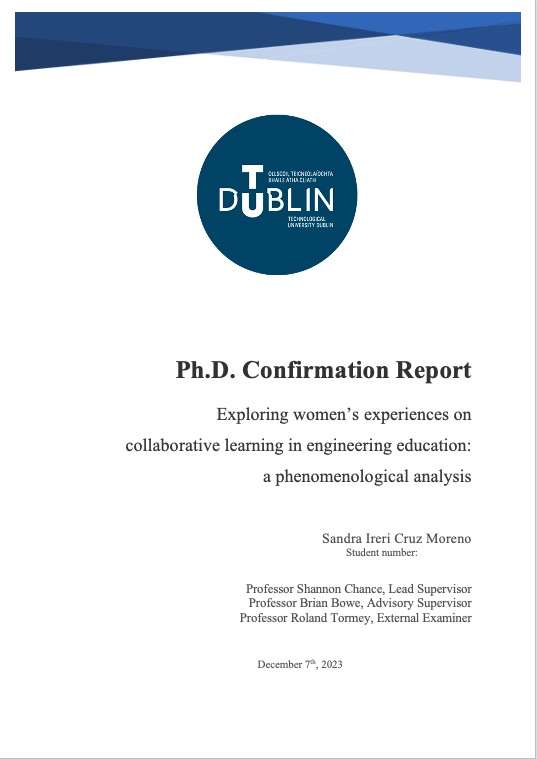So, I’m not going to lie: 2021 has been incredibly difficult for me. We’ve been on lockdown since before New Years Day here in Ireland. We are homebound and limited to a 5km travel radius from home for essential shopping and exercise (in the cold, wet weather and very short winter days). Moreover, we started the year by burying my partner Aongus’ father.
It’s been work, work, work and nearly no play. Staring at the screen has been taking its toll. Experiencing eye strain, I’ve not had the wherewithal to blog since that requires additional screen time over and above work. Sometimes it feels like I’m marking time, standing in place and making no progress forward.
But then someone asked for info that put some things back into perspective.
You may not know, but even though I am teaching Engineering and Digital Construction at TU Dublin right now, I am still actively engaged in research on engineering education. I’m part of two research centers–one here in Dublin (CREATE) and another in the UK (UCL’s Centre for Engineering Education).
The UCL Centre Coordinator, Paula Broome, is preparing the CEE’s annual report for 2020. She asked me to send a synopsis of my activities in Engineering Education Research. I dashed off the draft below for her to integrate into the report.
Writing this up took time (we’re on Spring Break here, but I can’t seem to get away from the computer). Nevertheless, it made me feel a bit better about forging ahead through 2020. And since it’s Spring Break, I can feel okay taking time away from work to blog!
Two items don’t show upon the list below that actually took a great deal of time in 2020. Hopefully, soon, I’ll be able to list two new journal articles with 2021 publication dates.
I could also have added that my blog made a difference to researchers in 2020. One thanked me on Facebook a couple days ago for providing resources that helped her win her own Marie Curie Research Fellowship in 2020. IrelandByChance.com had a record number of visitors in 2020, totalling 12,265 and beating my previous high of 12,141 visitors in 2013.
The most visited pages all involved the example Marie Curie materials I posted.
UCL CEE 2020 activities of Shannon Chance
Topic: implementing PBL pedagogies
CEE works to help engineering educators learn and implement active learning pedagogies, like problem-based learning. Shannon Chance published the following book chapter on PBL:
CHANCE, S. M. (2020). Problem-Based Learning: Use in Engineering Disciplines. In Amey, M. J. & David, M. E. (Eds.). The SAGE Encyclopedia of Higher Education, 5v. Thousand Oaks, CA: Sage. https://uk.sagepub.com/en-gb/eur/the-sage-encyclopedia-of-higher-education/book245423
In addition, this CEE-supported project was presented at a conference on PBL:
Mora, C. E., CHANCE, S. M., Direito, I., Morera-Bello, M. D., Hernández-Zamora, L., & Williams, B. (2020). INGENIA, a novel program Impacting Sustainable Development Goals locally through students’ actions. The International Research Symposium on Problem Based Learning (IRSPBL 2020) in Aalborg, Denmark.
Topic: diversity and inclusion
We believe in creating diverse and inclusive learning environments where all members feel welcome and supported—where they can be their true selves and realize their full potential. Inês Direito leads the SEFI working group on Equity, Diversity and Inclusion, and CEE’s Shannon Chance, Fiona Turscott, and Sophia Economides are frequent contributors to the group. Our team’s work includes a longitudinal, phenomenological study on Middle Eastern women’s experiences studying engineering abroad in Ireland, led by Shannon Chance, published the following Peer-Reviewed Conference Paper:
CHANCE, S. M., & Williams, B. (2020, May). Here you have to be mixing: Collaborative learning on an engineering program in Ireland as experienced by a group of Middle Eastern young women. EDUCON2020 – IEEE Global Engineering Education Conference in Porto, Portugal.https://ieeexplore.ieee.org/document/9125207
Shannon was also invited to present the work in Malaysia:
CHANCE, S., & Williams, B. (2020). Middle Eastern women’s experiences of collaborative learning in engineering in Ireland. Plenary forum Women in Engineering at the Regional Centre for Engineering Education conference (RCEE 2020) on “Engineering Education Leadership in an Uncertain World” at Universiti Teknologi Malaysia.
This Peer-Reviewed Conference Paper about Portuguese students’ experiences with Brexit also reflects our concern for Diversity and Inclusion:
Direito, I., CHANCE, S. M., & Williams, B. (2020). Exploring the impact of Brexit on UK’s engineering education sector from the perspective of European students. European Society for Engineering Education (SEFI 2020) conference in Twente, Netherlands.
Topic: ethics and sustainability
We are looking for ways to integrate the Sustainable Development Goals into our work and to infuse environmental sustainability, social justice, and ethics into our teaching and research. To understand these values are being enacted in London, our team has been conducting an exploratory study regarding UK civil engineers’ understandings and practices related to Global Responsibility (the topic of two articles we have under review with journals right now). Shannon Chance was invited to deliver a keynote speech on sustainability at a conference in China:
CHANCE, S., (2020). Equipping STEM graduates for global challenges via design thinking. Keynote speech for Chinese Society for Engineering Education’s 15th International Symposium on Science and Education Development Strategy on “Innovation of Engineering Education System under Global Challenges” held in Hangzhou, China 10-11 December 2020.
CEE members published the following Peer-Reviewed Conference Papers on sustainability in 2020:
CHANCE, S. M., Direito, I., & Mitchell, J. (2020). Challenges to global responsibility faced by London-based early-career civil engineers. European Society for Engineering Education (SEFI 2020) conference in Twente, Netherlands.
CHANCE, S. M., Direito, I., & Mitchell, J. (accepted in 2020, although the conference has been postponed until 2021). To what degree do graduate civil engineers working in London enact Global Responsibility and support UN Sustainable Development Goals? Engineering Education for Sustainable Development (EESD2020) conference in Cork, Ireland.
This paper, mentioned above under PBL, also focuses on sustainability:
Mora, C. E., CHANCE, S. M., Direito, I., Morera-Bello, M. D., Hernández-Zamora, L., & Williams, B. (2020). INGENIA, a novel program Impacting Sustainable Development Goals locally through students’ actions. The International Research Symposium on Problem Based Learning (IRSPBL 2020) in Aalborg, Denmark.
And finally, this workshop session intergated on sustainability:
CHANCE, S. M., & Villas Boa, V. (2020). Can we make future conferences greener and more equitable by providing online participation options? Breakout session of the Big EER Meet Up (online via UCL, April 2020).
Topic: Research Methods
CEE seeks to build research skills both across the members of CEE and more broadly. Shannon Chance build skill in teaching research methods by teaching a 5 ECTS module on the topic at TU Dublin in 2020. CEE members also provided the following workshops on research methods:
India
CHANCE, S., Direito, I., & Malik, M. (2020). An introduction to literature reviews in Engineering Education. Workshop for the Indo Universal Collaboration for Engineering Education (IUCEE). 22 November 2020.
Netherlands
Direito, I., CHANCE, S., & Malik, M. (2020). An introduction to systematic literature reviews and meta-analyses in Engineering Education. Workshop at the European Society for Engineering Education (SEFI) 2020 annual conference in Twente, Netherlands.
Edström, K.,Benson, L.,Mitchell, J., Bernhard, J., van den Bogaard, M., Case, J.; CHANCE, S., & Finelli, C. (2020). Best practices for reviewing manuscripts in engineering education research journals. Workshop at the European Society for Engineering Education (SEFI) 2020 annual conference in Twente, Netherlands.
Topic: global leadership in engineering education research (EER)
CEE provides leadership at the highest levels in engineering education—including both engineering education program development and engineering education research.
In April 2020, the CEE team organized and hosted the Big Engineering Education Research (EER) Meet Up, with 350 attendees worldwide. We followed this up in June 2020 with a second Meet Up for International Women in Engineering Day, that had 90 attendees. These were our primary activities for helping build academics’ capacity to conduct EER. At the start of 2020, Shannon Chance presented outcomes of the Marie Curie Research Fellowship she completed at UCL:
CHANCE, S. M. (2020). Becoming Civil: Outcomes of a Marie Curie Fellowship with CEGE and CEE. Lunch seminar for UCL’s Centre for Engineering Education in London.
Shannon Chance serves as the Chair of the global Research in Engineering Education Network (REEN). The term of Chair runs for the calendar years 2020 and 2021. As the head of the Governing Board of REEN, she has succeeded in diversifying and expanding the board to better represent the globe, helped organize REEN support for the CEE MeetUps at the outset of the pandemic, led the upgrade of the website for usability and economic sustainability, moved toward more transparent policies and procedures, and helped keep REEN operations on track.
To help grow a strong research community, we also supervise and mentor emerging researchers. In 202,0 Shannon continued to serve as a PhD supervisor and visiting processor at London South Bank University (LSBU). She has also been is highly active in UCL’s CEE and TU Dublin’s CREATE research group, helping aid communication between these two EER centers. In 2020, Shannon also reviewed conference paper submissions for the European Society for Engineering Education (SEFI) and EDUCON conferences.
Topic: global leadership in EER publishing
CEE work involves serving as top editors of the IEEE Transactions on Education, where John Mitchell is Editor-in-Chief and Shannon Chance is an Associate Editor. John and Shannon are also active contributors to the Engineering Education Research (EER) editors’ roundtables that assembles online and at the world’s top EER conferences and is creating resources to support authors and reviewers. John and Shannon are also both on the editorial board of the European Journal of Engineering Education (EJEE).
Shannon is currently the primary editor for a special focus issue on ethics in engineering education and practice, to be published in May 2021 by REEN’s Research in Engineering Education Symposium and the Australasian Journal of Engineering Education. In 2020, Shannon also served as a peer reviewer for all of the following journals:
International Journal of Qualitative Methods
Technology | Architecture + Design
Australasian Journal of Engineering Education
IEEE Transactions on Education
European Journal of Engineering Education
Journal of Engineering Education
Topic: public engagement
Outreach to the public is important to CEE. During 2020, Shannon Chance was interviewed for UK’s “Engineering Matters” podcast #59 Empowering Ethical Engineering (https://engineeringmatters.reby.media/2020/06/25/59-empowering-ethical-engineering/).
Shannon also served as an advisor for the recent publication of a children’s book “The Architecture Scribble Book” by Usborne Publishing Ltd.(2020). This built on past success with titled “The Engineering Scribble Book” by Usborne Publishing Ltd.(2018) which she also consulted on. Shannon also hosts the educational blog IrelandByChance.com.
CHANCE, S. (2012-present). Ireland by Chance: Research Adventures in Ireland and the UK. http://www.IrelandByChance.com showcasing research and fellowship activities.
Our team communicated and promoted research we have done via public channels:
CHANCE, S., Williams, B., & Direito, I. (2020). Tackling gender inclusion of Middle East students in engineering education with Project Based Learning. SEFI Newsletter.
CHANCE, S., Williams, B., & Direito, I. (2020, December 1). Project based learning: a tool for gender inclusion and enhanced team learning. Technological University Dublin blog for Diversity Equity and Inclusion. https://sway.office.com/fjc0aQKqkWotCl2J?ref=email&loc=play
Topic: CPD
Members of the CEE stay on top of their professional credentials. In 2020, Shannon Chance refreshed her Architectural Registration (license to practice) in the Commonwealth of Virginia, USA and maintained the National Council Record she holds with the USA’s National Council of Architectural Registration Boards which enables her to gain reciprocity in any of the United States. Shannon also gained a new credential, a Postgraduate Certificate in Building Information Modeling, at the February 2020 graduation ceremony at Technological University Dublin.
Topic: curriculum development
The CEE is currently developing new engineering curricula for Newgiza University in Cairo, Egypt. Emanuela Tilley, Al Mosart Hassan, and Shannon Chance comprise the core team developing the new curriculum in Architectural Engineering.
Topic: leadership in educational evaluation
In a similar vein to developing curricula, CEE also supports Quality Assurance and Accreditation processes. In 2020, Shannon Chance served on a review panel for a Substantive Change application submitted by the University of Puerto Rico to the USA’s National Architectural Accreditation Board (NAAB). Shannon also served as an external evaluator for applications submitted to Fulbright Ireland. In 2020, Shannon was also active in Quality Assurance at TU Dublin (Ireland), where as part of her role as Programme Chair for the BSc (Hons) in BIM (Digital Construction) she chaired the Programme Committee and served on the Extended School Executive Committee.








































